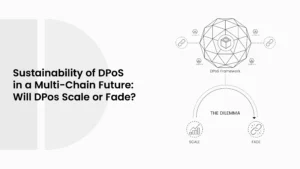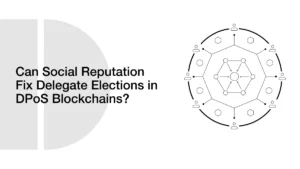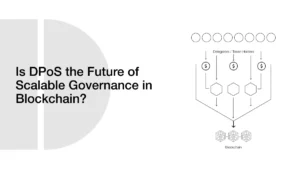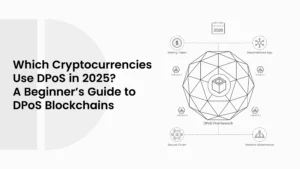DPoS Explained: Pros and Cons of Delegated Proof of Stake in 5 Minutes
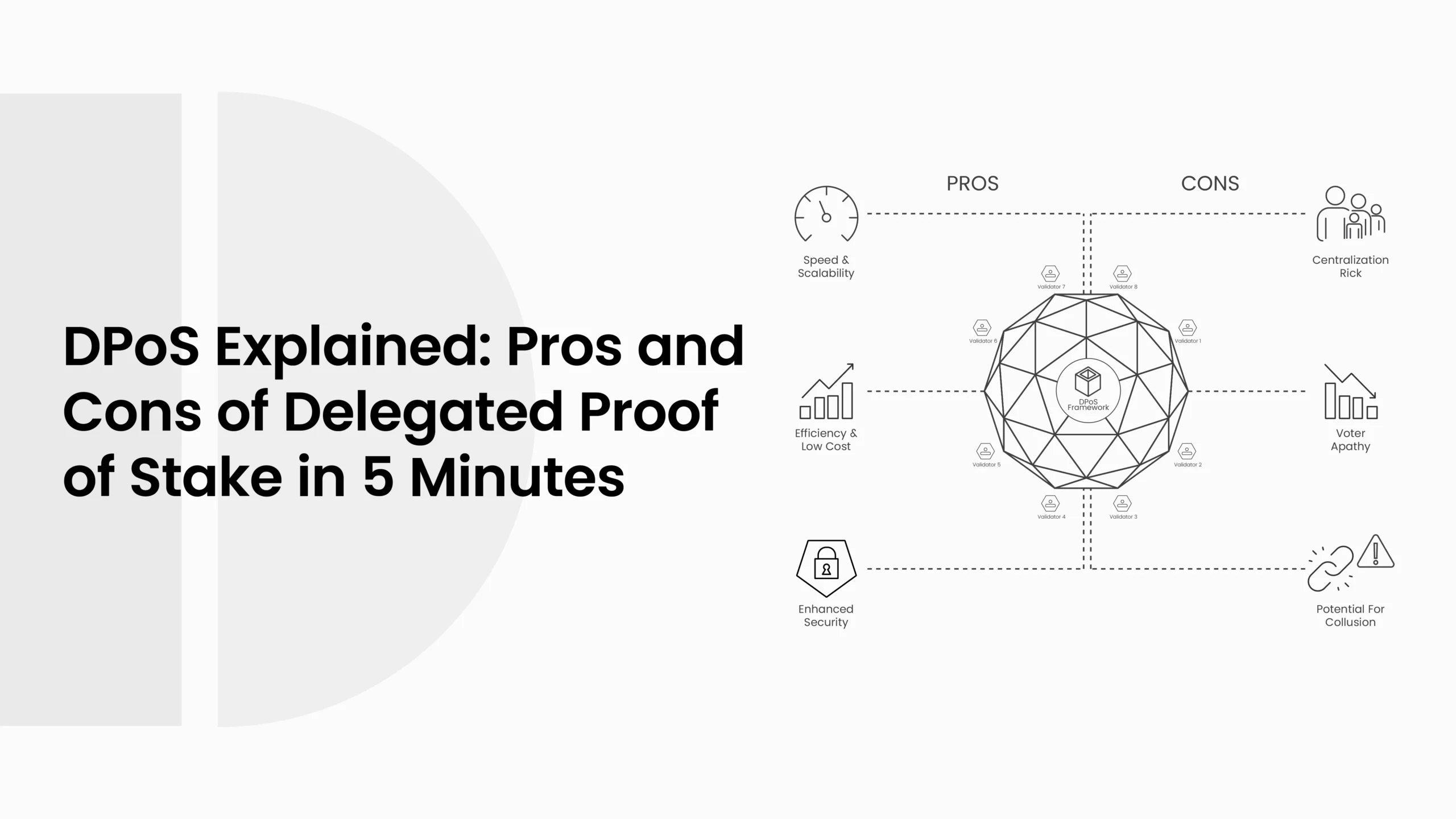
Delegated Proof of Stake, or DPoS, is one of the most widely used systems in blockchain for reaching agreement across a network. Unlike older methods like Proof of Work or standard Proof of Stake, DPoS is built for speed, energy savings, and community involvement. But it also comes with trade-offs that developers, users, and investors need to understand.
- What Makes DPoS Stand Out
- Why DPoS Can Be a Smart Choice
- It Is Much Faster Than Older Systems
- It Uses Very Little Energy
- It Gives Power To The Community
- It Is Easier To Scale
- It Lowers The Barrier To Entry
- What You Need to Watch Out For
- Voting Power Can Become Too Concentrated
- Delegates Can Work Together In Ways That Harm The System
- Many Users Do Not Vote At All
- Changes In Voting Can Cause Problems
- Some Delegates Are Not Fully Transparent
- Fewer Validators Can Mean More Risk
- The Bottom Line
- Frequently Asked Questions About the Pros and Cons of DPoS
- What is DPoS in simple words?
- How is DPoS different from Proof of Work?
- Can DPoS networks be hacked more easily?
- Do I need a lot of tokens to join DPoS?
- Why do people say DPoS can get centralized?
- Glossary of Key Terms
This article explains the pros and cons of DPoS in a clear and quick format that helps you decide when and why this model works.
ALSO READ: How EOS Uses Delegated Proof of Stake (DPoS) to Handle High Transaction Volumes
What Makes DPoS Stand Out
Delegated Proof of Stake (DPoS) functions by allowing token holders to elect a limited number of trusted delegates. These representatives will have the duty of appending new blocks to the blockchain and verifying the transactions inside.
The principal goal of this approach is to remove the excessive waiting periods that are usually associated with mining and to cut the high level of energy consumption that is evident in conventional systems. Although the mechanism itself seems simple at a glance, the internal structure introduces a unique set of advantages and disadvantages that still persist in influencing the blockchain design of today.
Why DPoS Can Be a Smart Choice
It Is Much Faster Than Older Systems
One of the most evident advantages of DPoS is its remarkable speed. The system relies on a smaller, pre-approved group of delegates instead of thousands of validators or miners operating simultaneously. This small number renders confirmation of transactions very fast, and it can take just a few seconds rather than a couple of minutes. Well-known networks such as EOS and TRON have adopted DPoS precisely for this reason, as they are able to process thousands of transactions per second, far exceeding what Bitcoin or even many Proof of Stake blockchains can manage.
ALSO READ: Proof of Work vs Delegated Proof of Stake: How DPoS Consensus Differs from PoW
It Uses Very Little Energy
DPoS does not require mining, which is energy-intensive. It does not need huge data centers or costly mining apparatus or constant electricity usage. The system could operate on a normal computer or even on a regular server system. This renders DPoS much more sustainable and eco-friendly. Some analyses even suggest that DPoS consumes up to 99% less energy compared to Proof of Work systems such as Bitcoin, though actual numbers may vary depending on the network’s configuration and activity level.
It Gives Power To The Community
Token holders in a DPoS system get to vote. This gives them real control over who validates blocks and runs the network. If a delegate stops performing well or becomes dishonest, the community can vote them out. This setup helps the network stay secure and gives the users more influence.
It Is Easier To Scale
Because only a few nodes are involved in confirming transactions, DPoS can scale faster than most other models. This renders it suitable for the application of games, finance, and social networks, among others, where speed is paramount. It also implies that the network is not limited to slowing down or becoming too costly to expand.
It Lowers The Barrier To Entry
DPoS requires no large amount of tokens or a full node to participate. You can just leave your tokens with a person whom you trust. This simplifies the process of involving more individuals in the network without requiring a technical background.
What You Need to Watch Out For
Voting Power Can Become Too Concentrated
Among the primary concerns frequently raised regarding DPoS is that voting power is largely based on the quantity of tokens one owns. It means that the user or the organization with a significant number of tokens can have a disproportional influence on the election. This means that the same representatives might be re-elected repeatedly, resulting in their gaining some form of permanent control over the network, which fails to conform to the principle of decentralization.
Delegates Can Work Together In Ways That Harm The System
When the same set of delegates remains in charge for long periods, there is a potential that they could start forming alliances or informal arrangements to maintain their control. Such behavior can damage the neutrality of the system and make it difficult for new participants to enter as delegates. There have already been examples in some networks where top delegates maintain dominance over the system with very little transparency, which reduces trust among the community.
Many Users Do Not Vote At All
Even though DPoS gives every token holder a right to vote, the truth is that many users simply don’t participate. Such a non-engagement gives some individuals with a small number of shares the opportunity to sway the majority of the decisions. Control is therefore concentrated among a few people when the number of voters is low, as opposed to it being shared among the entire network. This is inconsistent with the initial purpose of the DPoS, which was to establish a more democratic and equitable blockchain environment.
Changes In Voting Can Cause Problems
Due to the ability to change votes at any time, one can encounter sudden changes to the people in charge of the network. This may cause short-term problems, particularly when those who are delegated are done away with without adequate support. There should be systems to accommodate these changes in the networks.
Some Delegates Are Not Fully Transparent
Delegates are expected to be serving the best interests of the network, which is not always so. Others can give rewards to voters without necessarily giving value in the real sense, or they may not be giving out sufficient information regarding their operation. This secrecy will negatively affect trust and result in bad decisions on the part of voters.
Fewer Validators Can Mean More Risk
The fact that fewer nodes are used makes it faster, but it also implies that the network is highly reliant on a particular delegate. When a few of them fail or begin working in bad faith, the whole network may be affected. This is why the DPoS networks should turn to such tools as punishment for bad behavior or backup delegates.
ALSO READ: 8 Reasons a Validator Loses Your Vote in a DPoS System
The Bottom Line
Delegated Proof of Stake can be a great choice for fast, low-cost, and energy-friendly blockchain networks. It allows users to vote, rewards good performance, and supports apps that need to process transactions quickly. But it only works well if people stay involved, delegates stay honest, and the system is built with the right checks and balances.
When used correctly, DPoS offers a modern way to run secure and scalable blockchains. But like any system, it comes with risks. Keeping voting fair, preventing power from concentrating, and making sure delegates stay accountable are key to making DPoS work over the long term.
Frequently Asked Questions About the Pros and Cons of DPoS
What is DPoS in simple words?
DPoS means Delegated Proof of Stake. It’s a system where people who own tokens vote for a few delegates who make the blocks and keep the blockchain running. It’s faster and uses less energy than mining systems.
How is DPoS different from Proof of Work?
In Proof of Work (like Bitcoin), computers solve puzzles to earn rewards. In DPoS, people vote instead, so there is no need for all that power use. It’s like democracy, but in a blockchain way.
Can DPoS networks be hacked more easily?
Not really, but it can get risky if a few delegates or big holders control too much power. If they team up or stop acting honestly, the system can get weaker.
Do I need a lot of tokens to join DPoS?
No. You can just delegate your few tokens to someone you trust. That way, you still take part even without running a node or knowing much about coding.
Why do people say DPoS can get centralized?
Because the same delegates can keep getting elected again and again. If only rich token owners vote, then a few people can control the network, and that’s not very fair.
Glossary of Key Terms
DPoS (Delegated Proof of Stake):
A blockchain method where token holders vote for a small group of people called delegates, who make new blocks.
Delegate / Block Producer:
A trusted person or team who is chosen by votes to add new blocks and keep the blockchain safe.
Proof of Work (PoW):
An older blockchain system where miners solve hard math problems with computers to confirm transactions.
Proof of Stake (PoS):
A system where people lock their coins (stake) to get a chance to make new blocks and earn rewards.
Voting Power:
How much influence a person has when voting usually depends on how many tokens they own.
Centralization:
When a small group of people or companies controls most of the power or decisions in the network.
Validator:
Another name for someone who confirms blocks and keeps the blockchain running.
Slashing:
A kind of punishment used in some blockchains when validators break the rules or go offline.

